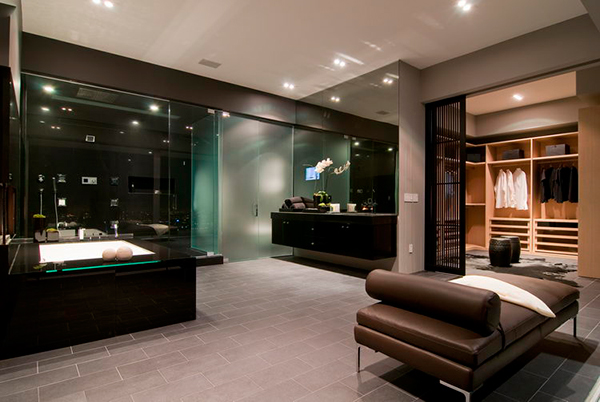|
|
|---|
Saturday, March 24, 2007
 Josef Hoffmann (December 15, 1870 Pirnitz, Moravia, now Brtnice, Czech Republic – May 7, 1956), was an Austrian architect and designer of consumer goods. He played a major part in the shaping of the aesthetic perception and aesthetic understanding of the 20th century. From 1887, Hoffmann attended the technical college in Brno, where he studied the methods of classical architecture. After his practical year in Würzburg as a student of architecture, Hoffmann studied from 1892 at the Academy of Fine Arts in Vienna, built by Theophil Freiherr von Hansen. In 1899 Hoffmann was appointed as a professor at the Viennese School of Applied Arts(Kunstgewerbeschule) and commissioned for the interior-design at the World Fair in Paris in 1900. Starting from the beginning of the 20th century a basic change in his style can be noticed. With the fortune of the young and art loving industrialist Fritz Wärndorfer and with the enthusiasm and creative power of Kolo Moser and Josef Hoffmann the Wiener Werkstätte was founded in May 1903 — the productive community of artists and craftsmen who was meant to impress the life of Hoffmann deeply as well as that of the whole Viennese art scene. The Wiener Werkstätte created pieces of arts, in a very distinctive style: the Wiener Werkstätte Style. The first big order for Josef Hoffmann and the Wiener Werkstätte, the building of the Sanatorium Purkersdorf (1904) including its interior design, came about by the acquaintance of the building contractor with the art critic Berta Zuckerkandl. The Sanatorium was designed for a circle of well-off patients. Dedicated to the highest levels of comfort and luxury, in its construction Hoffmann made use of the most modern available techniques — reinforced concrete. His original plan showed that he was inclined to take even more radical advantage of new construction techniques than in practice were actually possible. Decoration on the building was used sparingly. Before World War I the works of Josef Hoffmann shortly reveal an individual approach to classicism and ideally reflect the need of representation of a social class, whose days were already counted due to political circumstances. The Villa Skywa-Primavesi was Hoffmann's last great performance before the war, whose outbreak put an end to private enterprises for a number of years After 1919, Josef Hoffmann was very ill for many years. He even had to pass on the management of his studio to Oswald Haertl for some time. But Hoffmann applied himself to the creation of new forms till his death.
Josef Hoffmann (December 15, 1870 Pirnitz, Moravia, now Brtnice, Czech Republic – May 7, 1956), was an Austrian architect and designer of consumer goods. He played a major part in the shaping of the aesthetic perception and aesthetic understanding of the 20th century. From 1887, Hoffmann attended the technical college in Brno, where he studied the methods of classical architecture. After his practical year in Würzburg as a student of architecture, Hoffmann studied from 1892 at the Academy of Fine Arts in Vienna, built by Theophil Freiherr von Hansen. In 1899 Hoffmann was appointed as a professor at the Viennese School of Applied Arts(Kunstgewerbeschule) and commissioned for the interior-design at the World Fair in Paris in 1900. Starting from the beginning of the 20th century a basic change in his style can be noticed. With the fortune of the young and art loving industrialist Fritz Wärndorfer and with the enthusiasm and creative power of Kolo Moser and Josef Hoffmann the Wiener Werkstätte was founded in May 1903 — the productive community of artists and craftsmen who was meant to impress the life of Hoffmann deeply as well as that of the whole Viennese art scene. The Wiener Werkstätte created pieces of arts, in a very distinctive style: the Wiener Werkstätte Style. The first big order for Josef Hoffmann and the Wiener Werkstätte, the building of the Sanatorium Purkersdorf (1904) including its interior design, came about by the acquaintance of the building contractor with the art critic Berta Zuckerkandl. The Sanatorium was designed for a circle of well-off patients. Dedicated to the highest levels of comfort and luxury, in its construction Hoffmann made use of the most modern available techniques — reinforced concrete. His original plan showed that he was inclined to take even more radical advantage of new construction techniques than in practice were actually possible. Decoration on the building was used sparingly. Before World War I the works of Josef Hoffmann shortly reveal an individual approach to classicism and ideally reflect the need of representation of a social class, whose days were already counted due to political circumstances. The Villa Skywa-Primavesi was Hoffmann's last great performance before the war, whose outbreak put an end to private enterprises for a number of years After 1919, Josef Hoffmann was very ill for many years. He even had to pass on the management of his studio to Oswald Haertl for some time. But Hoffmann applied himself to the creation of new forms till his death. A perfectly coherent composition. A brilliant combination of practicality, productive economy and elegance. The famous Siebenkugelstuhl is a true symbol of modern furniture. The curved beech technique means that the chair back and back legs are formed from a single piece of wood. The spheres serve two purposes: they represent a pure, formal, decorative symbol and, at the same time, a structural union between the elements, making for an innovative assembly. This is a timeless design that was originally presented in 1908 at the Wiener Kunstschau by the Viennese master and reintroduced in a prestigious new edition by Gebrüder Thonet Vienna. A part from the classic natural and whitened beech wood, light and dark walnut, light and dark cherry wood, wengé and anthracite finishes, the Siebenkugelstuhl is also available in yellow, red, blue and orange painted versions.
A perfectly coherent composition. A brilliant combination of practicality, productive economy and elegance. The famous Siebenkugelstuhl is a true symbol of modern furniture. The curved beech technique means that the chair back and back legs are formed from a single piece of wood. The spheres serve two purposes: they represent a pure, formal, decorative symbol and, at the same time, a structural union between the elements, making for an innovative assembly. This is a timeless design that was originally presented in 1908 at the Wiener Kunstschau by the Viennese master and reintroduced in a prestigious new edition by Gebrüder Thonet Vienna. A part from the classic natural and whitened beech wood, light and dark walnut, light and dark cherry wood, wengé and anthracite finishes, the Siebenkugelstuhl is also available in yellow, red, blue and orange painted versions.0 Comments:
Subscribe to:
Post Comments (Atom)
































